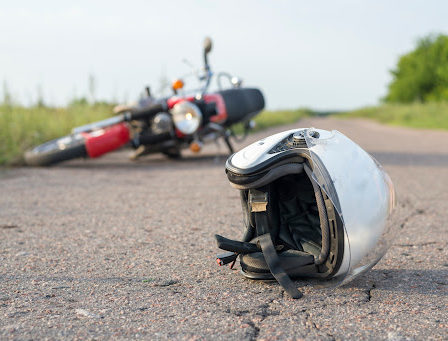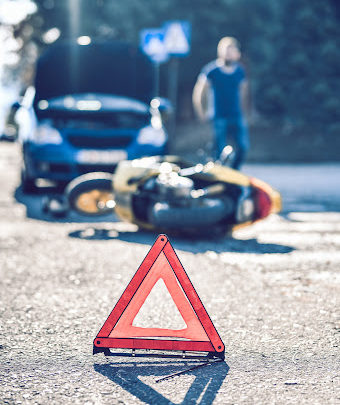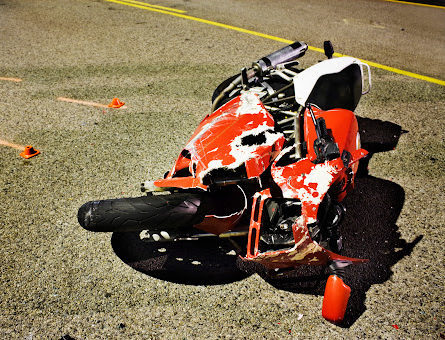10 Steps to Take After Being in a Motorcycle Accident

Nobody expects a motorcycle crash to happen to them, and yet thousands happen every year in the state of Louisiana. If you’ve been the victim of a motorcycle crash, you could be seriously injured, in physical pain, and unsure of what to do next.
All too often at Gordon McKernan Injury Attorneys, we hear our clients saying that they wished they’d done something differently following their crash so that they were better-equipped to handle the coming legal fight. We’ve compiled our top 10 tips to help future motorcycle accident victims maximize their compensation and hold the liable party accountable.
1. Call the Police and File a Police Report
Louisiana accidents resulting in injury or death, or in more than $500 of property damage, are required to be reported to the police. However, even if you think you or your bike haven’t been hurt after an accident, you should still call the police and file a police report.
A police report is a crucial piece of evidence that allows you to tell your side of the story in an accident. It also forces the at-fault driver to explain what they did wrong to cause the accident, and is a central place to record the names, contact information, and insurance information of yourself, the other driver, and witnesses.
All of this information can serve as evidence when making your motorcycle accident injury claim with insurance, or if your case goes to court, in front of a judge and jury.
2. Report All Injuries and Symptoms
After a motorcycle accident in Louisiana, it’s of utmost importance to report all of the injuries you’ve suffered and symptoms you’re experiencing due to those injuries. Report your injuries and symptoms to the police, EMTs, firefighters, and doctors and medical staff if you’re taken to the emergency room. Ensure that your symptoms are all recorded by medical staff, because those symptoms could be signs of serious conditions.
Even if you think you were unhurt or minorly hurt after an accident, report your symptoms to medical staff. Immediately after an accident, many people experience a rush of adrenaline or shock, which numbs the pain response from other injuries. Sometimes, symptoms can take hours or days to fully present themselves—so be proactive in describing your current symptoms after a wreck.

The following symptoms can be signs of especially serious conditions like a traumatic brain injury, so make sure the doctors know if you experience them:
- Loss of consciousness
- Loss of memory from immediately before or after the accident
- Feeling disoriented or confused
- Feeling drowsy
- Difficulty thinking clearly
- Headaches
- Dizziness or lightheadedness
- Slurred speech
- A ringing in the ears
- Doubled or blurred vision
3. Seek Medical Treatment Immediately
No matter how minor your injuries seem, seek medical attention as soon as possible following a Louisiana motorcycle wreck even if first responders do not deem it necessary. Many injuries can initially seem minor or insignificant, but later cause chronic pain, long-term damage, and even disability. Also known as delayed injuries, if they’re not documented immediately the other party could argue they were caused by another event.
In addition, the sooner you get diagnostic help and treatment, the sooner you can begin to recover from your accident. Of course, you should also return to your doctor if you experience any new symptoms, both for your health and for your claim.
4. Never Give Statements to an Insurance Adjuster
You could be called by an adjuster from your auto insurance or the other party’s, or even by a defense lawyer, who might ask you for a statement. Do not give a statement until you have talked with your own lawyer first!
The only reason these people want to talk to you is to have you deny or minimize your injuries, symptoms, or pain, in order to save themselves money. They’ll use your statement to try and prove that you are not as injured as you claim, then deny you benefits or compensation.
If an adjuster or other attorney is insistent they talk to you, direct them to your motorcycle accident attorney. This advice also applies if they want to come look at the damage to your motorcycle—do not allow them to do so unless your lawyer is present.
5. Never Sign Anything Without Talking to Your Lawyer

In addition to asking for a spoken statement, insurance adjusters and other lawyers might ask you to sign releases, waivers, settlements, or written statements. Never sign anything before talking to your attorney! This includes settlement checks from insurers and adjusters.
Almost all of these documents—even seemingly minor ones—will contain fine print effectively releasing the insurance company from all further liability in your injuries. This means that you could be left on the hook for the bulk of your accident injuries, even though you could be dealing with the fallout for the rest of your life.
6. Get a Copy of Your Police Report
Call the police department where your accident happened and order a copy of the police report for your records. You can order police reports for Louisiana crashes online from the Louisiana State Police.
7. Attend All of Your Medical Appointments
Attending all of your doctor’s appointments and follow-ups isn’t just for your health. It also proves—to insurance adjusters, juries, and judges—that you actually experienced the injuries you claim. Neglecting medical appointments can be used as “evidence” that you aren’t actually experiencing the pain or damages you’re seeking and used to deny your claim.
8. Keep Detailed Records
It’s vitally important to keep your own records following a motorcycle accident in Louisiana in order to establish a paper trail of your experiences. These records can strengthen your case and maximize your compensation. We recommend recording at least the following:
- Doctor’s visits, prescriptions, other medications, lab services, physical therapy appointments, treatments, medical documents, and X-rays
- The date and price of every visit
- A daily diary of your pain, discomfort, emotional state, fatigue, and other experiences
- A report of how your injuries and their resulting pain have impacted your relationships and daily life
- Photographs of your injuries, as soon as possible after the accident
- Copies of all medical bills, records, and other documentation
9. Check Your Insurance Policy
Some auto insurance policies feature specific reporting requirements or other requirements in order to file a claim. Check your policy yourself, or ideally, have your lawyer take a look at it so that you can start your injury claim process as quickly as possible and start your road to healing.
Remember—your insurance policy is a contract with your insurance provider. As long as the language contained within it follows Louisiana law, you are bound by the requirements and strictures within that document—so be sure to follow them.
10. Talk to an Experienced Motorcycle Accident Lawyer

Possibly the most important step after any injury you’ve suffered is to call an experienced personal injury lawyer. They can help you navigate the complex legal process after your accident and help you avoid any mistakes that may negatively impact your claim. Gordon McKernan Injury Attorneys have over 679+ years of combined legal experience helping Louisiana residents recover the compensation they need following a motorcycle accident, and we can help you too.
Give us a call at 888.501.7888 for a free consultation today. A dedicated motorcycle injury lawyer will listen to what happened and provide advice on how best to proceed. We will also negotiate on your behalf with insurance and other parties, and we’ll even represent you in court. Call us today to begin healing from your motorcycle accident injuries.

